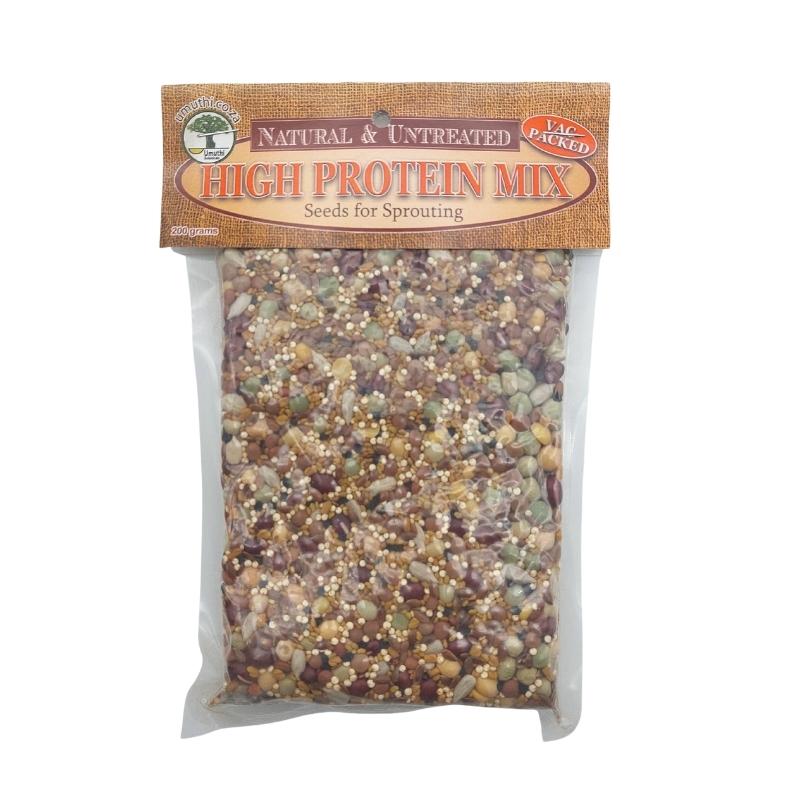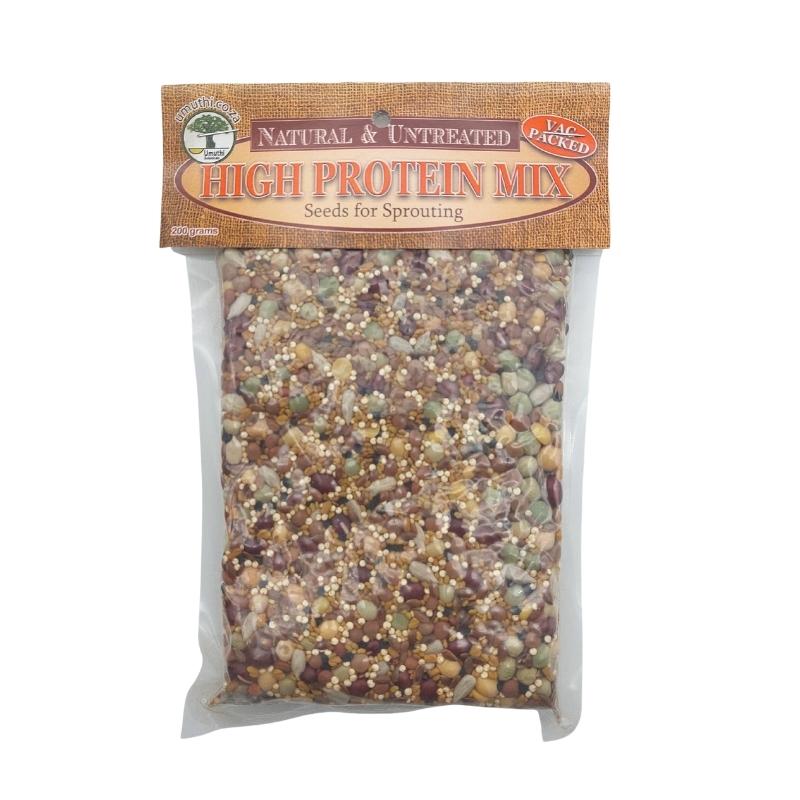Umuthi High Protein Mix Sprouting Seeds
Umuthi High Protein Mix Sprouting Seeds
2 in stock
Couldn't load pickup availability
Protein is an important part of a healthy diet, and Umuthi's Protein Mix consist of Adzuki Beans, Alfalfa Seeds, Green Lentils, Chick Peas, Fenugreek, Garlic Chives, Green Peas, Onion Seeds, Quinoa, Soybean and Sunflower Seeds, delivering easily absorbed essential amino acids.
Sizes: 200g, 500g or 1kg.
High protein mix sprouting seeds uses
- A tasty treat
- Typically used in French cuisine
Benefits of high protein mix sprouting seeds
- Vacuum packed for total freshness
- Natural and untreated
- Non-GMO
High protein mix sprouting seeds contents
Adzuki Botanical name: Vigna angularis
Adzuki beans are a typical red-brown/maroon bean shaped with white eyes. This bean is native to East Asia and the Himalayan region, and is reported to have increase energy, lower blood pressure and detoxify the body.
Nutritional Value: This food is very low in Saturated Fat, Cholesterol and Sodium. It is also a good source of Phophorus, Potassium and Copper, and a very good source of Dietary Fibre, Folate and Manganese.
Alfalfa (Lucerne) Botanical name: Medicago Sativa (Pea Family) Also known as Lucerne in South Africa
Alfalfa is a fine, golden coloured, quick sprouting seed and probably the best known sprout in health circles. It produces a deep green leaf that has a delicious mild flavour plus great nutritional properties.
Nutritional Value: Alfalfa is very low in Saturated Fat and Cholesterol, and a good source of Protein, Vitamin E (Alpha Tocopherol), Thiamin, Riboflavin, Pantothenic Acid, Calcium, Iron, Magnesium, Phosphorus and Selenium, also a very good source of Dietary Fibre, Vitamin A, Vitamin C, Vitamin K, Vitamin B6, Folate, Potassium and Manganese.
Lentil Green Botanical name: Lens (Culinaris)
Green Lentils are a light or dark brown disc shaped seed, larger than the brown lentil. Well known as a nutritious cooked food, there is more Iron and Copper in the sprouts. By sprouting legumes you neutralize phytic acid and lectins, which means more vitamins and minerals can be absorbed by your body as they are digested. Sprouting increases the amount of vitamins and minerals in the lentils, especially B Vitamins and Carotene. Sprouting also helps break down some of the sugars that create intestinal gas. Lentils have the highest level of protein of any legume, after soya, and whilst not a complete protein, once sprouted they contain sufficient levels of amino acids.
Nutritional Value: Very low in Saturated Fat, Cholesterol and Sodium, it is also a good source of Thiamin, Iron, Phosphorus and Manganese, and a very good source of Dietary Fibre and Folate.
Chickpeas Botanical name: Cicer Arietinum
Also known as Garbanzo beans they are irregular, round, tan coloured seeds which have a delicious nut like taste and a texture that is buttery, yet somewhat starchy and pasty. A very versatile legume, they are a noted ingredient in many Middle Eastern and Indian dishes such as hummus, falafels and curries. Chick peas are a legume and therefore contain certain anti-nutrients, but sprouting neutralizes this.
Nutritional Value: They are protein and carbohydrate rich with relatively low calories, low in Saturated Fat, and very low in Cholesterol and Sodium. They are also a good source of Dietary Fibre, Protein and Copper, and a very good source of Folate and Manganese.
Fenugreek Botanical name: Trigonella Foenum-graecum
Fenugreek is an irregular shaped, golden coloured seed with a pungent smell. It is frequently used as a spice in Indian cuisine. When sprouted it has a milder flavour.
Nutritional Value: Very low in Saturated Fat and Cholesterol, a good source of Protein, Vitamin E ( Alpha Tocopherol), Thiamin, Riboflavin, Pantothenic Acid, Calcium, Iron, Magnesium, Phosphorus and Selenium, and a very good source of Dietary Fibre, Vitamin A, Vitamin C, Vitamin K, Vitamin B6, Folate, Potassium and Manganese.
Green Peas Botanical name: Allium Schoenoprasum
Green Peas are a typical pea sized, pale green seed, which also grown into an excellent microgreen.
Nutritional Value: Low in Saturated Fat, Cholesterol and Sodium, a good source of Protein, Vitamin A, Riboflavin, Niacin, Vitamin B6, Folate, Magnesium, Phosphorus and Copper, and a very good source of Dietary Fibre, Vitamin C, Vitamin K, Thiamin and Manganese.
Onion Botanical name: Allium family
Onion seed is small, flat, black and irregular shaped. We use brown onion seed which is the highest quality. Allium sprouts are unlike other seeds as they produce the root first.
Nutritional Value: Onion is very low in Saturated Fat, Cholesterol and Sodium. It is also a good source of Dietary Fibre, Vitamin B6, Folate, Potassium and Manganese, and a very food source of Vitamin C. It has a high sugar content.
Quinoa Botanical name: Chenopodium Quinoa
Quinoa is a small round, either white or red seed. It is part of the Amaranth family, related to Spinach and Beetroot, and was originally grown in the Andean region of South America. It is classed as a Pseudocereal as it is actually a seed, not a grain. One of its great health benefits is that is contains no gluten.
Nutritional Value: Very high in Protein, contains essential amino acid Lycinde, the B group vitamins, Calcium, Phosphorus, Iron and Calcium.
Soybean Botanical name: Glycine Max
Soybean are an unevenly round, soft mustard coloured seed. Although a legume, it is classed as an oilseed and not a pulse by the United Nations Food and Agricultural Organizations. High in protein and used as a vegetarian and lactose alternative for many foods, Soya has transcended it's Asian origins to become the most widely cultivated legume across the globe.
Nutritional Value: Very low in Cholesterol. It is a good source of Dietary Fibre, Protein, Vitamin C, Thiamin, Folate, Calcium, Magnesium, Phosphorus, Potassium and Manganese.
Sunflower Botanical name: Helianthus annuus
Sunflower is a de-husked, creamy grey, oval seed. They are super fast sprouters and can be eaten within 2 days, or later if you prefer more of a leaf, thereby making it an excellent choice for microgreens.
Nutritional Value: Very low in Cholesterol and Sodium. It is also a good source of Thiamin, Vitamin B6, Magnesium, Phosphorus, Copper, Manganese and Selenium, and a very good source of Vitamin E (Alpha Tocopherol).

Seeds sprout at different times
Not recommended
Buy individually would be a better option
Quality very good but as I said the small seeds take much longer to sprout than the larger ones


